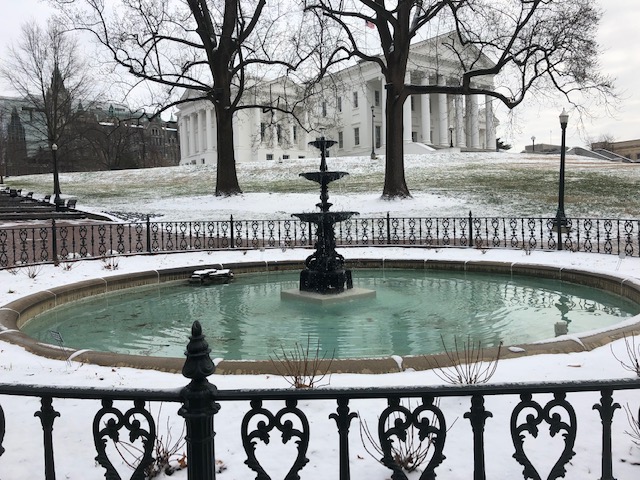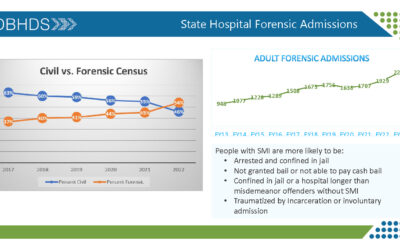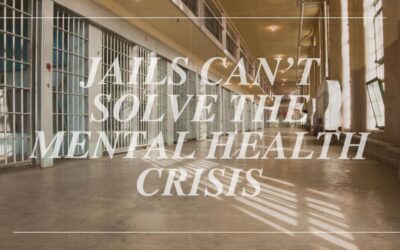Mental Health Bills Advance
Several mental health bills we support are moving forward. This week the Senate begins hearing bills approved by the House and vice versa, and we are pleased to see several initiatives that improve mental health are still alive. A few of interest:
Workforce – “Barrier Crimes” – Bipartisan support and years of work by advocates are finally removing some of the criminal history barriers to employment for Peer Recovery Specialists. Both HB 1269 (Price) and SB 626 (Pillion) have passed their respective houses. They provide limited exceptions to criminal history barriers to employment in Mental Health Treatment programs.
Decriminalizing Suicide – HB 81 (Simon) abolishes the common law crime of suicide. After several years of trying, the bill might succeed with bipartisan support. Common Law crimes are not in the criminal code, but are carried over from old English common law when suicide was considered an offense against God and the King, with a punishment of improper burial. Today the problem is mostly about moral and practical support for family members, including eligibility for local tax breaks for the survivors of military service members. It passed the House 62 to 37, and is now before the Senate Committee for Courts of Justice. *For more information, see our blog https://mhav.org/suicide-is-a-crime-in-virginia-since-when/
Training on the “Red Flag Law” – Substantial Risk Orders. HB 637 (Sullivan) requires the state to establish a training program for law-enforcement agencies and others on the proper use of substantial risk orders – court orders to remove firearms from someone determined to be a threat to themselves or others. The original law was passed a few years ago and can prevent suicides, but many localities have not implemented it and there is reluctance to apply it due to a lack of training.
Strengthening Community Care – Crisis Stabilization Centers – HB 1336 (Sickles) and SB 568 (Deeds) allow these vital community based crisis care facilities to use certain medications in treating patients in mental health emergencies. This enables more people to get appropriate crisis care in their own community and without long waits for a state hospital. Both bills have passed their respective chamber.
Incentives for referral to mental health care – As introduced, SB 87 (Favola) would have requiredhealth insurance provider panels, when contracting with primary care providers, to provide incentives for appropriate referral to mental health services. What actually passed the senate is optional and not nearly as strong, but still important, and deserves support in the House.
Mental health treatment for health care professionals – HB 42 (Hope) adds dentists and dental hygienists to the health care professionals to the review process for career fatigue and wellness. Most importantly, it removes the requirement that voluntary admission for mental health or substance use treatment automatically must be reported to a health regulatory board if the health professional no longer is believed to be a danger to himself, the public, or their patients.
Family member presence during commitment evaluations – SB 546 (Bagby) and HB 1242 (Willett) allow a supportive family member to be present during the mental health emergency custody or detention evaluation of someone, “… unless the individual objects or the evaluator or treating physician determines that the presence of any such person would create a medical, clinical, or safety risk to the patient or health care provider or interferes with patient care.”
[Note: A truly bipartisan bill, Governor Youngkin and Democrats Bagby and Willett sponsored this effort on behalf of Irvo Otieno’s mother. She was denied access to support and calm her son and his behavior escalated, beginning a downward spiral and his death by suffocation a few days later, with murder charges against the deputies who restrained him.]
Investigating abuse at state hospitals – SB 178 (Favola) and HB 313 (Hope) direct the Office of the State Inspector General to develop a plan to fulfill its statutory obligation to fully investigate all complaints it receives alleging abuse, neglect, or inadequate care at a state psychiatric hospital, to submit the plan to legislative committees, and provide annual reports on the number of allegations, investigations, etc.
Felony assault against law enforcement while in a mental health crisis – Proposals from Senator Boysko and Delegate Watts (SB 357, HB 267) are expected to narrowly pass both houses. They address the current practice of bringing felony charges with a mandatory 6-month jail sentence against someone with a serious mental illness or intellectual/developmental disability whose behavior, in the midst of a mental health crisis, gets them arrested for assaulting a law enforcement officer. A complicated issue, and the substitute versions change the bills to an “affirmative defense to prosecution”- a disappointment, but still an improvement, and worthy of support. [For more detail, see our blog post https://mhav.org/when-a-call-for-help-gets-you-jail-time/ ]
Increasing the number of school counselors and support positions – An urgent need, but unfortunately the House versions HB 181 (Feggans), HB 386 (Hernandez) were carried over to next year due to the estimated combined $119 million one year cost to the state budget. The Senate version SB 127 (VanValkenburg) was incorporated along with several other education bills into an omnibus SB 105 (Lucas) that creates an At-Risk Program for students who are educationally at risk. There are no staffing targets, but it may be a vehicle to increase services through a different budgeting approach.
Other mental health services for school students – HB 919 (Srinivasan) provides for school boards to increase the accessibility of school-based tele-therapy services for students who may not have access to mental health services otherwise. The original bill used the word “shall.” The amended version that passed the House substitutes the word “may” for “shall.” Still a positive step.
Instruction on mental health education – HB 603 (Price) would have added more teeth to current requirements that school boards provide for mental health education as part of the public school health curriculum. It failed last year, but at least this year a watered down substitute passed the full House 59 to 41 and is going to the Senate. It adds more specific topics to what must be covered in mental health education, requiring the Department of Education to develop new mental health curriculum resources and guidance to be used by local school divisions.
What’s next? You can see where a bill is in the process by clicking the bill number link above.
Your delegate and senator would like to hear from you, and the legislator contact information is below:
If you don’t know who your legislators are, you can find out here: Who’s My Legislator?




